Arizona Diamondbacks CEO Derrick Hall won't let his cancer change the best workplace in sports
PHOENIX – Derrick Hall and his wife, Amy, asked their 10-year-old daughter, Kylie, for a moment to talk last fall. They explained her dad's cancer diagnosis in terms she could understand, that he would need surgery to remove a walnut-sized gland called a prostate that only men have.
Hall thought of the enormous hours he joyfully put into his job as president and CEO of the Arizona Diamondbacks. He reflected on his father's cancer and on a colleague from the Colorado Rockies who had died unexpectedly and left a family. He pondered the mystery of how this disease can strike out of nowhere, how it can disorient and devastate even the most buoyant among us.
He'd be OK, he told Kylie.
"I'll walk you down the aisle someday, I promise," he said before kissing her on the forehead.

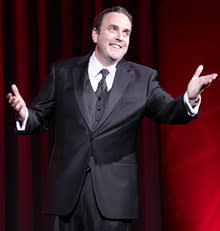
Derrick Hall is a very public CEO for the Diamondbacks, who were chosen as the best sports team to work for in the world.
(Jason Wise/Arizona Diamondbacks)
Barely two months after the surgery, Hall, 43, is back to working 12-hour days. He exudes energy and vigor. He is the primary reason the Diamondbacks were chosen the best sports organization to work for in the world by the United Nations and why the team has on several occasions been listed among the best employers in Arizona and beyond.
A recent evening billed as the Diamondbacks Most Valuable Partner Awards provided a glimpse into what a blast it is to be part of the team's workforce. Rank-and-file employees were dressed to the nines, gleaming and beaming as they welcomed guests walking in on a red carpet at a posh casino ballroom. Several other employees stood backstage preparing to venture far outside their job description by singing, dancing and honoring winners in a spot-on facsimile of the Academy Awards show.
The Diamondbacks' corporate partners had it good, too. A table was set for each company and among the executives sat team icons: former star players Luis Gonzalez, Mark Grace and Matt Williams, current players Ian Kennedy, Chris Young, Paul Goldschmidt and Ryan Roberts, and general manager Kevin Towers.
The show began and Hall morphed into a hybrid of Jay Leno, P.T. Barnum, Bill Veeck and Dale Carnegie, acknowledging advertising partners by singing show tunes and cracking wise, presenting hilarious video clips and poking fun at himself.
No one could have possibly guessed Hall's medical condition, except that he had willingly disclosed it at employee gatherings and through the media. Being accessible and transparent is fundamental to his management style. He listens to every complaint, every congratulations. After games, he spends hours replying to emails from fans. His guiding principle in dealing with employees, and for employees dealing with fans, is the acronym FAWTSY: Find a Way to Say Yes.
The awards show was a culmination of his vision to make business and pleasure indistinguishable. When Kennedy, the team's 20-game winner in 2011, joined Hall on stage, he joked to his boss, "I'm never nervous on the mound but I'm nervous up here. This isn't my element. … This is your element, obviously."
Hall's cancer battle was forgotten for a few hours. "This showed a human side to all of us," he said. "We aren't just corporate buttoned-up executives. We are real people, we have fun and we aren't afraid to make fun of ourselves."
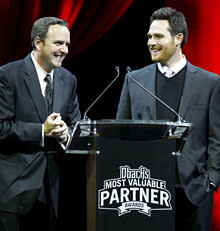
D-backs pitcher Ian Kennedy (right) tells CEO Hall that performing onstage is "his element."
(Jordan Megenhardt/Arizona Diamondbacks)
He said 15 sports organizations had contacted him ahead of the event, wanting to replicate it. No wonder he is favored at the highest levels of the game. His name comes up when a successor to commissioner Bud Selig is discussed, and Selig and his closest confidantes are among Hall's biggest admirers.
"Derrick is clearly one of the best young executives we have in baseball," Chicago White Sox owner Jerry Reinsdorf said. "He's one of the ones we expect to lead as time goes by."

That a bright light could be suddenly extinguished by cancer at such an early age was a jarring notion. Telling Kylie and her brothers Logan, 16, and Hayden, 13, of his diagnosis marked the end of two tortuous days for Hall. The Diamondbacks were in San Diego for a three-game series against the Padres last September and had lost the opener on a Friday night. Hall ducked into a diner the next morning for breakfast, spotted Arizona pitcher J.J. Putz and sat down with him.
Hall's cell phone rang. It was his doctor informing him tests had established cancer was present in his prostate and that he'd need surgery. Hall turned to Putz and said, "It's cancer."
Putz was puzzled. "Who?"
Hall: "Me."
Pitcher Josh Collmenter came by their table and Putz ushered him away. "We're all here for you," he said to Hall. "You know that."
Hall walked to his hotel room in a daze and called Amy. His next call was to Diamondbacks owner Ken Kendrick, who immediately became more than a boss. Kendrick had his own cancerous prostate removed in 2004 and his cell number is provided to newly diagnosed patients. A self-made multimillionaire, he's counseled more than 100 prostate cancer patients from all walks of life. He knew exactly how Hall felt upon getting the diagnosis.
"It's like getting hit in the head with a boat oar," Kendrick said.
The National Cancer Institute estimated that nearly 250,000 men were diagnosed with prostate cancer in 2011 and that nearly 35,000 of them died. About 2.35 million men alive have had prostate cancer, yet less than one percent of those diagnosed are under 45 years old.
[Rewind: Prep standout Dorial Green-Beckham didn't let his brother's cancer distract him]
Hall struggled to grasp that he'd just joined an enormous, cheerless men's club as one of its youngest members. He paced across the hotel room, then before heading to the ballpark met with Cullen Maxey, the Diamondbacks executive vice president for business operations, at a pizza restaurant for what he thought would be a quick lunch.
Maxey, like Hall, is young, positive and energetic, a born salesman. The Academy Awards-style show for ad partners was his idea. Hall told him about the cancer. Both men are fit and health-conscious, but in perhaps Hall's only act of defeatism, he ordered a pizza covered with mashed potatoes, bacon and cheese.
"I know I'm in for a life change here," Hall told Maxey. "Let's have something bad to eat."
They chewed the fat and digested the news. Hall wondered how his employees would take it. Before Maxey could respond, Hall was banging out an email on his Blackberry. He handed the phone to Maxey, who began to cry as he read it:
Dear Team: I recently had a PSA test that came back with a bit of concern. I was instructed to undergo a prostate biopsy, which was uncomfortable but necessary. That was Wednesday, and I was told I could learn the results as early as yesterday. This morning I left the team hotel in San Diego to grab a late breakfast. While there, my doctor called and said he had results. I stepped outside to hear that I have prostate cancer. Needless to say, I was in a state of shock, lost, and too shaky to dial my wife's number. Why would I share with you all so openly? Because I share everything with you, my family. And you will help me and my beautiful immediate family get through this. I will win! Survival rate is high, and I will be an "add on" to the statistics. Before I schedule a date for surgery we have business to take care of! I love this team and I love all of you. Please understand that we haven't even told our children yet because we want to do it face-to-face when I return home. Believe it or not, this is not on my mind as much as "Go D-backs" right now. Let's push this team as much as they are pushing. God Bless us all, Derrick |
Responses flowed in the next several hours, nearly 200 in all dropping into his inbox even as the game against the Padres began that evening.
"I honestly didn't know our employees had this in them," Maxey said. "They felt so hurt, a member of their Diamondbacks family and the one they probably care about more than anybody was going through this. They were so worried. It was something I'll never forget, ever."
The Diamondbacks were on the verge of clinching the National League West, completing one of the most dramatic worst-to-first turnarounds in recent memory. The Padres beat them on Saturday night and after the game Hall ducked back to his room. He was all alone for the first time and broke down.
He pulled out a notepad and started listing everything he would miss by dying young.
-- I'm not going to walk Kylie down the aisle
-- I'm not going to see what Hayden becomes
-- I'm not going to see Logan play college tennis
-- I won't grow old with Amy
-- I won't see the Diamondbacks win a World Series
He called Amy and read her the list. She sobbed into the phone. "I'm sorry," Derrick said. "This isn't like me."
The next day Arizona won and Putz notched his 41st save. He handed Hall the game ball. "I can't take this," Hall said. Then he paused, flipping the ball up into his hand. "I'll give it back to you when the cancer is completely gone."
"Deal," Putz replied.
The team returned home and five days later clinched a playoff berth. On one of Hall's first days back in the office Maxey summoned him to what Hall was told would be a private meeting. He walked in and every Diamondbacks employee was present.
They all stood and raised their arms. Around their wrists were red bands that read "D-Hall, D-Backs."

Every year Hall rounds up his dozen Employees of the Month and takes them on a trip. Disneyland and the set of the "Tonight Show with Jay Leno" are favored destinations. Hall loves the customer experience at the iconic amusement park and pushes his employees to make Chase Field something of a desert Disneyland.
"When a fan spills popcorn, I want somebody out there with a broom the minute they walk away," he says. "That's the way it's done at Disney. We whistle while we work, too. We have fun, just like at Disneyland."
Hall enjoys Leno and other comedians and talk-show hosts because he's a born showman just like them. He and Jimmy Kimmel were friends at Arizona State. After breaking into baseball as a public relations man in the late 1980s with the Dodgers, Hall did spot-on impressions of then-owner Peter O'Malley, manager Tommy Lasorda and broadcaster Vin Scully. He gives hour-long motivational speeches to companies without the benefit of notes.
Rather than hold a traditional monthly employee meeting, he implemented an idea conceived by HR senior vice president Marian Rhodes and launched "On the Couch with D-Hall." Everyone convenes at Chase Field and Hall puts on a variety show of wisecracks, pertinent information, cheerleading, interviews and a faux-Family Feud game show that forces new employees to immerse themselves in a corporate culture like no other in sports.
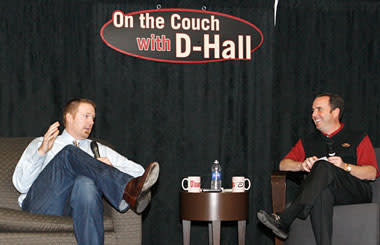
Diamondbacks pitcher J.J. Putz (left) is a guest during a meeting of all team employees conducted in a talk-show format by president and CEO Derrick Hall.
(Jonathan Willey/Arizona Diamondbacks)
"With our company the customer doesn't come first, the employee comes first, and when we treat our employees well, they in turn treat the customers well," Hall said. "We recognize our employees, we respect our employees, we promote our employees."
The culture extends into the Diamondbacks clubhouse. Kirk Gibson, who developed a gruff and volatile image as a player, surprised everyone in baseball with his even-handed, patient approach as a manager. He was chosen the National League Manager of the Year in his first full season, and in the minds of Hall and Towers, he could have been employee of the year as well.
"Gibby keeps the players humble," Towers said. "He respects other managers and teams. When the sense of fat and happy creeps in with players, boom, he brings them back. And Gibby manages the Diamondbacks' brand as well as the team. He insists that players sit up straight and wear team logos on their clothes during interviews."
Sometimes managers feel isolated from team executives, believing they are particularly vulnerable to second-guessing. Gibson, an extraordinarily confident man, isn't that way. He's also appreciative, as evidenced by an email he sent to Kendrick and Hall after the team re-signed pitcher Joe Saunders to a one-year, $6 million deal two weeks ago, bumping the payroll to $80 million – more than $10 million higher than originally budgeted.
From: Gibson, Kirk Subject: Thank you...here we go Ken, Derrick, Just want to drop you both a short note thanking you for the support you have given us all since day one of our journey. KT called me today and told me you guys had signed off and we had stretched our budget again to bring Joe Saunders back into our rotation. This move strengthens our rotation tremendously and will make the team very excited about our chances of realizing our goals as we start spring training to get ready for the regular season. More importantly is the statement which you both have made since our meetings last spring by showing us all in the organization your continued equal support to everyone in the Diamondbacks family. We are all grateful for your leadership, understand our common goal, and will be dedicated to see your visions thru. You have certainly done your part...and we are excited to do ours! Sincerely, Gibby |
Gibson and Towers were brought in when manager A.J. Hinch and GM Josh Byrnes were fired late in the 2010 season with the team in last place. Those were Hall's first major personnel decisions the public cared about.
"It's a difficult process but one all leaders have to go through," Hall said. "We knew we had to change the direction of our philosophy and approach on the baseball side. It's one where I had to do some convincing to ownership and one I felt strongly about. The lesson was that you need your own people in those kinds of jobs."
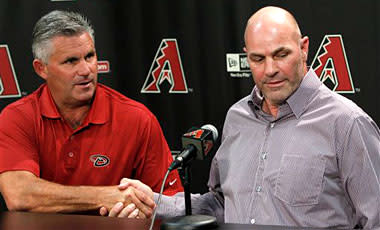
Diamondbacks GM Kevin Towers (left) and manager Kirk Gibson produced a National League West title a year after the team finished in last place.
(AP)
Hall might whistle while he works, but there's no mistaking the competitive hiss in this Diamondback. He wrestled control of the team from executive Jeff Moorad after coming aboard in 2005, rising from senior vice president of communications to team president in a year and adding CEO to his title in January 2009. Moorad departed and is trying to purchase the San Diego Padres while also running that team's day-to-day operations.
At employee meetings, Hall will occasionally make a disparaging joke about Arizona's NL West competitors, and the Padres are a prime target. He attends every home game, sitting near the dugout and watching each pitch intently.
Diamondbacks star outfielder Justin Upton was tossed from a game at San Francisco in early September when the pennant was up for grabs. Hall read of the ejection on his Blackberry. He banged out a tweet that said, "Umpires need to realize they are NOT the center of attention. Tossing a MVP candidate in a pennant race for a call YOU blew is bush!"
A couple days later Hall's secretary, Brooke, yelled into his office, "Commissioner Selig on the line." Hall gulped. Selig told him that he too had been competitive when he owned the Milwaukee Brewers. But Selig made it clear the tweet was a mistake and shouldn't be repeated. The normally effusive Hall said something along the lines of "Yes, sir."
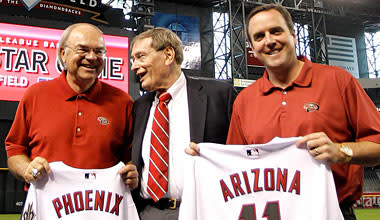
Diamondbacks owner Ken Kendrick (left) and MLB commissioner Bud Selig (center) believe Derrick Hall is an executive with great potential.
(AP)
Selig couldn't stay angry for long. He doesn't hide his affinity for Hall, saying, "What I like about Derrick is that he is intimately involved in the Diamondbacks organization every day, not just four days a week, not just three weeks a month.
"He's very interested in baseball as a whole business. Derrick from my standpoint is what you want in an executive. He immerses himself to the point that he not only changes the culture, he changes everyone around him."
Right down to the tiniest details. One day last season Hall was looking onto the concourse from his office as fans streamed in before a game when he saw it happen: A man spilled a box of popcorn and immediately a worker appeared with a broom to sweep it up.
Hall smiled broadly and thought, "Just like Disneyland!" He turned to his computer and excitedly banged out an email to his executive team describing what he'd witnessed.
Everyone had a great laugh the next morning at a staff meeting when Hall was told the entire episode had been staged for his benefit.

Hall is pleased when employees pull a prank on him. It tells him they are comfortable and enjoying their jobs. Fulltime baseball employees routinely work 12-14 hour days during the season, arriving at 9 a.m. and not leaving until after the game ends at 10:30 p.m. or so. A tolerable workplace is necessary; a joyous one is best.
The same applies to the fans' experience. Fans often approach Hall at his seat during games. At one of his first games as team president in 2006 a woman walked up and said, "You look like an idiot. You are wearing a suit and it's 100 degrees outside. You want us to buy Diamondbacks' merchandise and you aren't even wearing it."
Hall thanked her, loosened his tie and watched the game. The next day he brought employees together and said, "No more suits. No more ties. Wear the logo. Wear the brand."
After that season Hall decided to change the team's colors from a slap-dash combination of purple, turquoise, copper and black to a more cohesive look dominated by what the Diamondbacks called "Sedona red" in a nod to an artsy town in Northern Arizona. He also made the abbreviated team name D-backs official. "Everybody calls us that anyway," he said.
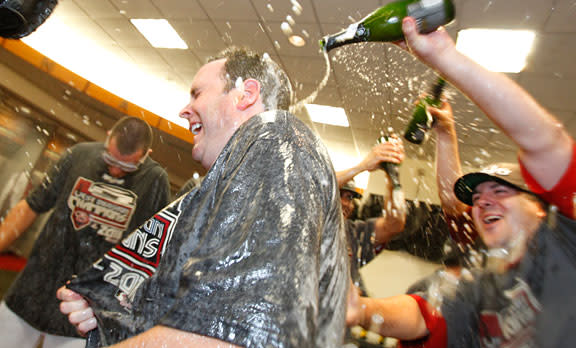
Hall is doused in champagne by players after the Diamondbacks clinched a playoff berth.
(Jordan Megenhardt/Arizona Diamondbacks)
Hall held a meeting of season-ticket holders and had former star third baseman Matt Williams model the uniform to them. Midway through the presentation, one particularly vocal fan named Bob Ellmer stood up and said, "Stop with the Sedona Red, already. Red is red!"
Last year Ellmer was dying of cancer and Hall called him at the hospital. Ellmer told him that he'd had a dream in which he was dead and hovering over the stadium. "I looked down, saw my empty seats, and on them it read, "Red is red – Bob Ellmer."
And that's what will be inscribed on seats 11 and 12 in row W, section 145 at Chase Field this season.
Hall's one-fan-at-a-time approach includes those struggling financially. He established a season ticket scholarship program that since 2008 has resulted in 57 families being given tickets worth more than $365,000. He keeps a box of D-backs caps in his car and if he sees somebody wearing an old purple and turquoise cap, he hands the person a new one. When he spots somebody in a restaurant wearing D-backs gear, he hands them a business card that can be redeemed for two free tickets.
On a recent weekday Hall appeared as a guest on a news show at the local ABC television studio. The segment ended, Hall turned to the cameraman and visibly blanched: The man was wearing a San Diego Padres cap.
"Take that off!" Hall commanded.
The man shrugged and said his family had owned Padres season tickets since 1969.
Hall made a noise that was half growl and half laugh. "I'll give you free tickets if you take off that cap."

Six weeks removed from prostate surgery, Hall was in fine form at the owners meetings in early January. He engaged owners, CEOs and presidents from rival teams in conversation, generating discussion that resulted in best practices of several organizations being shared with others.
Sports teams are different than most businesses because success is measured in victories on the playing field, not just revenues. Teams by nature are highly competitive and reluctant to reveal anything that might give an opponent an edge, yet several league and team executives said Hall has a knack for breaking down those barriers.
"From a personality standpoint, people gravitate to Derrick," said Mike Crowley, who is beginning his 14th year as president of the Oakland Athletics. "People want to do well by him. He has an easy manner about him that makes him an effective leader.
"At the owners meetings, multiple people in the room have encountered what your team is encountering. Derrick gets people talking."
Crowley, 47, and Hall are among the youngest high-level MLB executives. Another was Keli McGregor, the Colorado Rockies president who was Hall's closest friend outside the Diamondbacks when he died in a Salt Lake City hotel room of a viral heart infection in April, 2010. McGregor, a former Colorado State and NFL tight end, was fit, vibrant and only 48 years old.
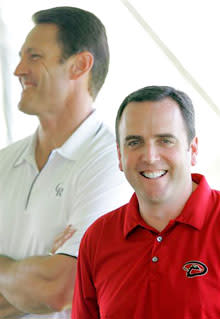
Colorado Rockies president Keli McGregor (left) and Hall worked together to build a joint spring training facility in Scottsdale, Ariz. McGregor, Hall's closest friend outside of the Diamondbacks, died in April, 2010.
(AP)
"He was the strongest man I ever knew," said Hall, who has a photo collage of McGregor and his family on the wall above his desk. "I think about him every day."
McGregor and Hall spearheaded the development of a 140-acre spring training facility the Rockies and Diamondbacks share in Scottsdale, Ariz., called Salt River Fields at Talking Stick. It opened a year ago and is the most lavish spring facility in the big leagues.
"Keli and I worked together at each step to make that a reality," Hall said. "To think that he never saw it in its full glory and completion … It makes me appreciate every day and not take anything for granted."
Hall, McGregor and Crowley were among a small group of MLB leaders who socialized together, meeting for breakfast and dinner at owners meetings. Los Angeles Angels chairman Dennis Kuhl usually joined them, and at the meetings in January he couldn't help but reflect on the incongruity of two executives with perhaps the brightest futures in baseball being confronted by mortality at such a young age.
"Keli's death affected me unbelievably," Kuhl said. "I was in shock. He was here one day, gone the next. Then this coming on with Derrick. It's unbelievable how he's handled it. He talked about cancer surgery openly. He has that infectious smile and laughs at himself about it. We've all been able to share what he's going through."
McGregor isn't forgotten. When the executives gather for a meal they leave one chair open at the table. Fortunately, it appears they won't need to leave a second chair vacant any time soon.
Hall's first blood test since his surgery was cause for optimism. No cancer was detected. The result was a relief because Hall was told after the surgery that a pathology report indicated a marginal escape of cancer cells to the urethra. He'll have a blood test every three months to ensure the cancer hasn't resurfaced.
Besides Amy, Hall's primary lifeline is Kendrick, the D-backs owner and prostate cancer survivor. Kendrick's surgeon, Dr. Inderbir Gill, removed Hall's prostate and Hall leans on his boss every time he has a question or concern about his recovery.
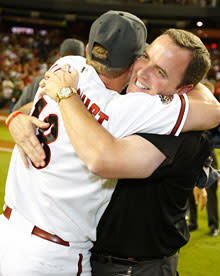
Hall and infielder Willie Bloomquist embrace after the D-backs clinched the NL West.
(Jordan Megenhardt/Arizona Diamondbacks)
"The interesting thing about Derrick is that he totally publicized all this," Kendrick said. "This cancer is eminently curable if detected early. If it escapes the prostate gland and gets into the body, it lowers the likelihood of living from 98 percent to less than 10 percent. He wanted the public to know that he is a younger man, and that other men need to get that test."
Hall still tweets periodic updates on his condition at @DhallDbacks.

Shortly after Hall's surgery, his father was placed into hospice care after a three-year fight with pancreatic cancer. Larry Hall, a career newspaper advertising executive, died in December at 68. His son – knowing he'd just been diagnosed with cancer himself – delivered the eulogy.
"We'll hear things, like his dad's voice on the answering machine, and yes, we were afraid," Amy Hall said. "I never imagined growing old without Derrick, rocking on a chair together, all those silly things. He tells me, 'You have those feelings, but you have to push them out and stay positive.' "
Lately his energy has returned to his pre-surgery Herculean level. He and Amy hosted a dinner at their home for 80 United Way employees a few nights ago. He's constantly on the radio and local television, pumping up the D-backs. He pops his head into offices and cubicles at Chase Field, chatting with employees who sell tickets, solicit advertising and evaluate the farm system.
His approach fosters the culture the United Nations recognized in giving the inaugural Positive Peace Award for a sports team to the Diamondbacks. It's why MLB has Hall on its short list of candidates to replace Selig when he retires, perhaps as soon as 2014. It's why several of the groups seeking to purchase the Dodgers have contacted Hall to become the CEO should their bid win.
For now, Hall is thinking only of his family and day-to-day schedule. That the latest blood test had no trace of the disease was an enormous relief. Hall's optimism again teetered on boundless. He called Amy with the news and she shared it with the kids. Kylie, the 10-year-old, screamed in joy and went to her room. When her dad came home from work, he had this waiting for him:
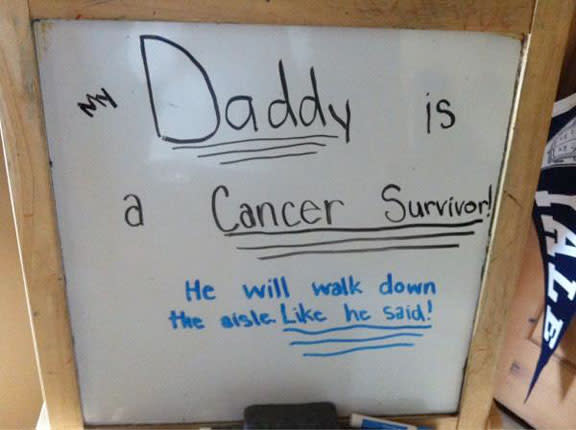
Other popular content on the Yahoo! network:
• Rangers' Yu Darvish just the latest hyped foreign player
• San Francisco Giants will go as far as Buster Posey carries them
• News: Russia blames radiation for failure of Mars moon probe

 Yahoo Sports
Yahoo Sports 
